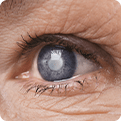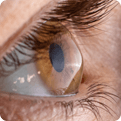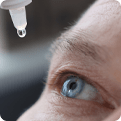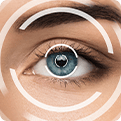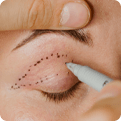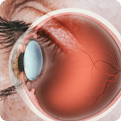Newark’s Trusted Glaucoma Treatment Provider
With glaucoma causing permanent vision impairment for many people each year, patients benefit from early detection, comprehensive testing and precise treatment. Our center is equipped to deliver the entire spectrum of care, from diagnosis to ongoing treatment. And with many years of glaucoma expertise, we treat all forms and stages of the condition.

What Is Glaucoma?
Glaucoma is a degenerative condition associated with fluid management in the eye. The eye constantly produces a clear fluid which helps maintain its shape. This fluid continuously flows through the eye and exits through a drainage system. The delicate balance between the production and drainage of the fluid determines the eye’s intraocular pressure (IOP). If the fluid inside the eye does not drain as quickly as it is produced, the IOP will rise and glaucoma develops.
High IOP can cause damage to the optic nerve, eventually resulting in irreversible blindness. It is estimated that over three million Americans have glaucoma, but only half are aware that they have the disease because they don’t experience any symptoms.
Vision that is lost from glaucoma cannot be restored, but early diagnosis and treatment by your family eye doctor can help save your sight. If your eye doctor suspects glaucoma and you need a more in-depth evaluation, he or she may refer you to Eye Care of Delaware for more tests and treatment.
Types of Glaucoma
Primary “Open-Angle” Glaucoma
This is the most common type of glaucoma, accounting for approximately 70% to 90% of all cases. It develops when the drainage channels in the eye are open but not working efficiently – imagine a clogged drain. While the fluid in the eye continues to be produced at a normal rate, it is draining sluggishly. This causes the intraocular pressure (IOP) to gradually rise, which damages the optic nerve.
As eye pressure builds, it can gradually lead to some of the symptoms below.
- Damage to the optic nerve
- Loss of peripheral vision
- Blindness, if left untreated
Open-angle glaucoma is often called “the sneak-thief of sight,” as patients usually have no symptoms until significant vision loss has occurred. Most people with open-angle glaucoma feel fine and do not notice a change in their vision at first. This is because the initial loss of vision occurs with their side vision (peripheral vision). There may not be changes in visual acuity or sharpness of vision until late in the disease. So by the time a patient is aware that they’re experiencing vision loss, the issue is usually quite advanced.
Regular eye exams are extremely important, allowing your physician to determine signs of optic nerve damage and make an early diagnosis.
“Closed-Angle” Glaucoma
In closed-angle glaucoma (also called “angle-closure glaucoma” or “narrow-angle glaucoma”), the drainage channels in the eye are actually closed or blocked. This causes the IOP to rise, leading to optic nerve damage and possible vision loss. This rise in eye pressure may occur suddenly (an acute attack of angle-closure) or gradually (chronic angle-closure).
An acute-closure glaucoma attack can be very painful and is a true eye emergency. Symptoms of acute angle-closure glaucoma are very noticeable, and damage occurs quickly. Should you experience any of these symptoms, seek immediate care from your eye doctor.
- Sudden blurry vision
- Severe eye pain
- Headache
- Nausea
- Vomiting
While many people with the slowly developing chronic-angle closure glaucoma don’t experience any symptoms at first, they won’t know they have it until the damage is severe – or they have an attack. In contrast, angle-closure glaucoma can cause blindness if not treated right away.
What Are the Risk Factors for Getting Glaucoma?
There is no way to prevent glaucoma. And while anyone can develop glaucoma, these are risk factors to consider.
- Age of 60 years or more
- A family history of glaucoma
- A history of an eye injury, disease or tumor
- Thin corneas
- Diabetes, high blood pressure, heart disease, or issues with blood circulation
- Severe farsightedness
- Long-term use of steroids or cortisone
- African American, Asian, Hispanic or Native Alaskan descent
Having more than one of these glaucoma risk factors puts patients at an even higher risk of developing glaucoma. The best way to avoid the negative consequences of this disease is to have regular glaucoma examinations.
Early Detection of Glaucoma Is Important
Because glaucoma is most often asymptomatic, early detection is absolutely key. A complete dilated eye exam is an excellent screening tool. If there is any suspicion of glaucoma (high eye pressure or visible damage to the optic nerve), further testing will be performed.
Glaucoma Testing
Glaucoma eye exams incorporate a group of five tests that offer early detection of the condition for long-term protection of your vision.
- Measurement of eye pressure
- Corneal thickness measurement (pachymetry)
- Direct visualization of the drainage system in the eye using a specialized lens (gonioscopy)
- A detailed scan of the optic nerve (OCT)
- Testing for peripheral vision loss (Visual Field Test)
When a patient is diagnosed with glaucoma these tests are performed regularly – in conjunction with regular eye exams – to monitor for changes in the health of the optic nerve.
Glaucoma Treatments
Glaucoma is an insidious eye disease, and unfortunately there is no cure. Treatment cannot reverse any existing damage to the eye that was caused by glaucoma – and the progressive vision loss from this disease cannot be stopped. However, glaucoma can be slowed down by lowering the intraocular pressure (IOP) and keeping it low.
Once glaucoma has been diagnosed, treatment should begin as soon as possible to lower the IOP. At Eye Care of Delaware, our eye specialists offer several treatment options that can help manage the disease. Most cases of glaucoma can be treated with eye drops, laser surgery or microsurgery. The best treatment for your individual case depends on the type and severity of the disease.
With any type of glaucoma, regular eye examinations are very important to detect progression and to prevent vision loss. Because glaucoma can get worse without your even being aware of it, your treatment may need to be changed over time to achieve a lower “target eye pressure.”
If you need an optometrist, call our office and we can refer you to one.
Common Questions About Glaucoma
How does glaucoma affect vision?
Glaucoma affects peripheral vision first and progresses to central vision if left untreated. Patients may experience a reduced field of vision as their side vision deteriorates. However, early detection and treatment can prevent severe issues.
Can glaucoma be prevented?
No. In fact, people may be at greater risk if glaucoma runs in the family. There are, however, steps that can reduce the risk. These include wearing protective eyewear to prevent sun damage, eating a healthy diet, following a regular exercise regime and so on. Most importantly, people should schedule consistent eye examinations to identify any problems quickly.
Is glaucoma a cause of blindness?
Yes. Glaucoma is a common cause of severe visual impairment and blindness. Glaucoma is a progressive condition that causes the gradual deterioration of vision, so early diagnosis and treatment are crucial.
What are MIGS?
Experienced Glaucoma Care and Surgery in Newark, DE
Eye Care of Delaware offers comprehensive care and treatment for glaucoma. As first-class glaucoma specialists, we have successfully diagnosed and treated patients from Delaware, Maryland, New Jersey and Pennsylvania. For assistance, call (302) 454-8800 or request an appointment now.

